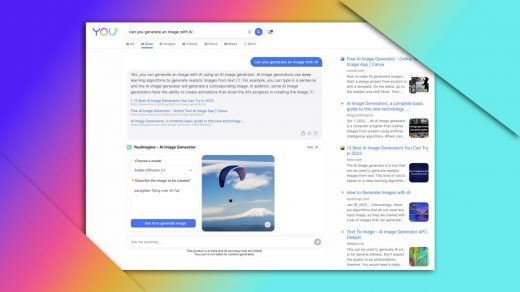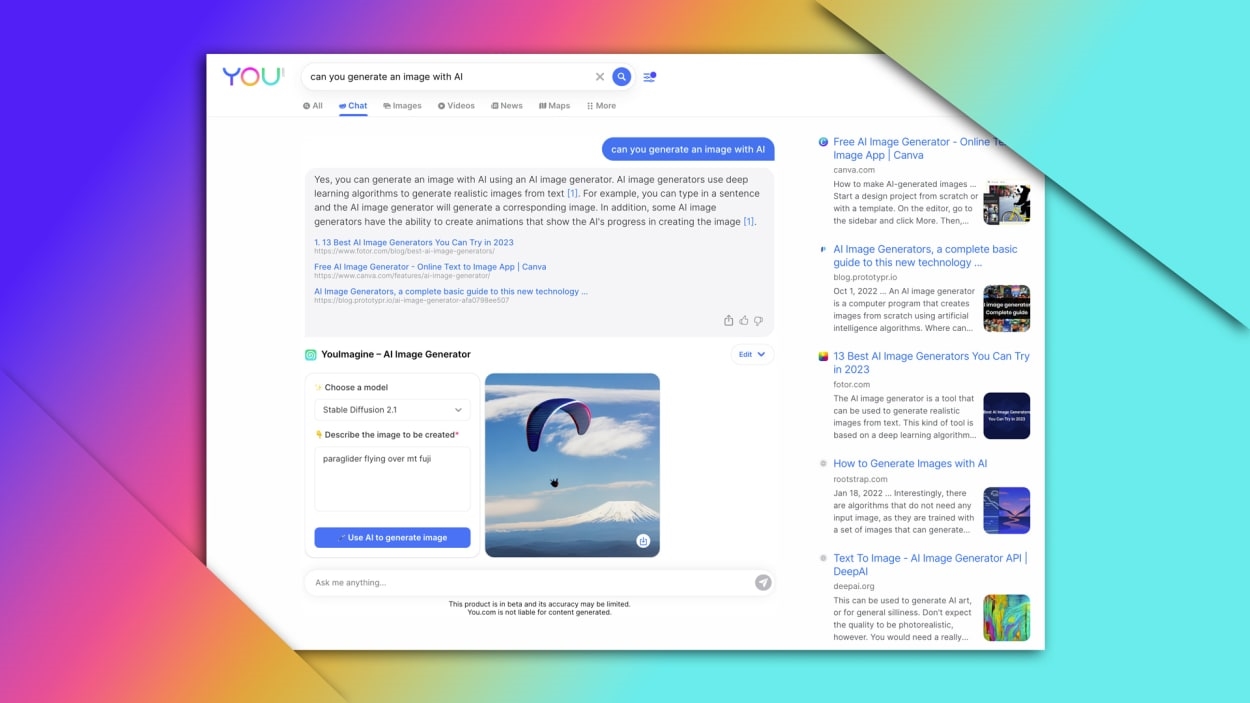Search upstart You.com is melding its AI chatbot with mini-apps
Richard Socher is an AI scientist—formerly an adjunct professor at Stanford—who is #4 on Google Scholar’s list of citations for natural language processing. He’s also the founder and CEO of a scrappy search-engine startup called You.com. So, it’s no shocker that You.com is investing in generative AI, the trendy technology that helps computers understand written requests from human beings and respond in language that can be eerily glib.
At the moment, it would be odd if any search engine chose to spurn generative AI, which gets its smarts by crunching vast amounts of written language into algorithms called large language models. OpenAI’s ChatGPT is the fastest-growing consumer application in history. Search’s big dog and most formidable underdog—Google and Microsoft’s Bing–are both embracing generative AI with devil-may-care-speed. You.com is actually a bit ahead of the game: It rolled out the first version of its YouChat bot in December and is now on version 2.0. Meanwhile, Bing’s new AI is still in preview mode, and Google’s Bard is even further from full deployment.
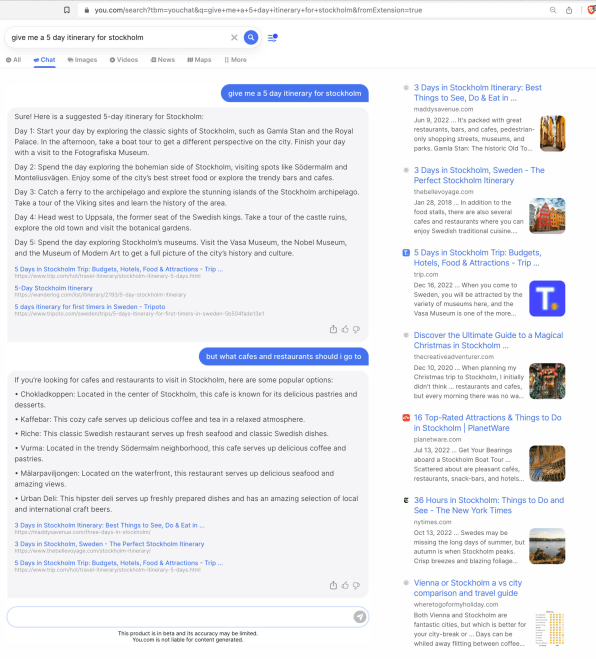
What’s intriguing is how each search company is dealing with AI’s current limitations and melding it with other forms of search. In the case of YouChat, it’s not about rendering other forms of search obsolete. In fact, YouChat is tightly integrated with the embedded apps that You.com also introduced in December. Those apps, created by both You.com and third-party developers, are “a big part of making this more equitable, rather than just one company kind of owning that first page of the internet, with zero clicks going outside of their ecosystem,” says Socher.
You.com already calls on more than 40 apps to buttress YouChat’s capabilities. Ask the chatbot for a stock price, for instance, and it will reply with a clickable graph, not just a single number. Answers of all kinds may include modules with text and images drawn from Wikipedia. And you can ask YouChat to generate artwork based on your text description, a feat it accomplishes by incorporating generative AI tools such as Stable Diffusion. Other apps involve additional types of content such as embedded movie trailers and LinkedIn info. And there are also links along YouChat’s right side, supplementing the AI chart with search in its more conventional form.
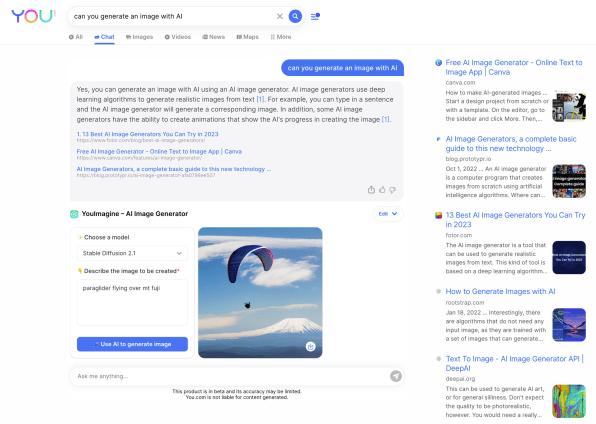
YouChat’s use of these mini-apps and conventional search results can put useful tools at your fingertips in a way that purely textual, AI-generated answers can’t. But this approach also helps the search engine get around generative AI’s current limitations, most notably its tendency to hallucinate and simply get stuff wrong, oftentimes in ways you won’t notice unless you already knew the answer.
By way of example, Socher talks about a search for his former employer Salesforce’s current stock price: “All the other [large language models] will make up a bunch of numbers,” he says. “Instead, our LLM decides, ‘Oh, the best way to tell you that answer is to just show you the ticker, and you can look at all the times and numbers and different months and days.’ And then you can still ask a follow-up question: ‘Okay, who’s the CEO?’ And it’ll do that, too.”
That’s not to say that You.com has conquered generative AI’s tendency to indulge in fantasy math and other forms of factual error that leave the whole technology feeling like a raw experiment rather than a dependable tool. When I asked YouChat about Microsoft’s revenue, it answered in AI-generated text, and provided a figure that was plausible-sounding but incorrect. It offered misinformation in response to plenty of my other test queries, too. But more than most AI-infused search engines, You.com is upfront about the technology’s present limitations: “This product is in beta and its accuracy may be limited,” reads a disclaimer below the text input field.
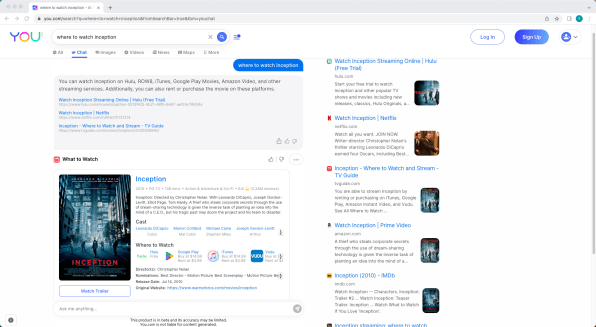
Like Microsoft’s new Bing, YouChat’s AI-generated answers include citations at the bottom. Theoretically, they’re links to related information elsewhere on the web, which would help you delve deeper on a topic and fact-check the AI along the way. However, I found that in some cases the links were about other subjects altogether, apparently as a result of the chatbot being led astray by particular sequences of queries.
When I asked Socher about the details behind You.com’s AI, he didn’t have much to say other than to stress that YouChat isn’t just sitting atop someone else’s algorithm, such as OpenAI’s GPT3. “We had to build a lot of our own stuff,” he says. “We don’t quite explain all the details, because there’s a lot of competition that would like to quickly copy what we’re doing.”
As for how You.com will make money, Socher says that the company plans to display privacy-minded ads and offer for-pay apps. It’s already dabbling with the latter revenue stream via YouWrite, an app that generates text such as emails and blog posts and charges $1 to $2 a week for paid plans. Even if You.com is destined to compete with AI search features created by vastly larger companies with massive resources, he contends that the fact his startup doesn’t already have a business model in place will be a long-term advantage.
“I think there’s going to be a classic innovator’s dilemma where, if you make $150 billion by showing five, six ads on a page, you don’t really want to replace three or four or five or six of those ads with one useful AI [element] in the center,” he says. “Because you immediately lose $500 million a day. The less revenue you have, the more willing you are to embrace that in your future.”
(18)

